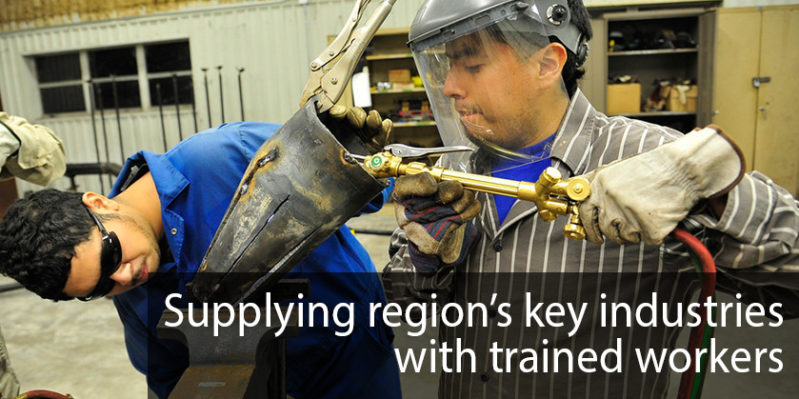
 San Jacinto College works with companies to deliver right training for oil and gas and manufacturing industries
San Jacinto College works with companies to deliver right training for oil and gas and manufacturing industries
Contrary to headlines, the oil and gas industry is booming, especially on the downstream side. This could explain why there’s an even bigger need for skilled process operators, instrumentation technicians, welders, and pipefitters.
Case in point, everyone Joshua White knows within the field of instrumentation is working. After just one year of studying instrumentation at San Jacinto College, he was offered a job. Four years later, White is making well over $70,000 a year working in the oil and gas industry.

(Left to right) Jose Jaimes and Jorge Gonzalez work on eccentric reducers in a San Jacinto College pipefitting class. Process technology, non-destructive testing, welding, pipefitting, electrical, and instrumentation graduates are in demand throughout the region.
Photo credit: Rob Vanya, San Jacinto College marketing, public relations, and government affairs department.
“The jobs are plentiful,” said White, who was hired by Rice University as an instrumentation technician upon graduating and has since been hired with Kinder Morgan to work with natural gas pipelines. “The money varies where you go, but it is really great in oil and gas.”
Other major factors that contribute to the need for more workers include expansions with large corporations. ExxonMobil is set to create 10,000 construction jobs and more than 4,000 related jobs with its multi-billion dollar expansion project in Baytown. The company recently contributed $1 million toward workforce training and student scholarships at local community colleges. Celanese Corp., announced its construction plans for a plant in Clear Lake. Dow Chemical Co., also is building a new chemical facility in Houston. Shale gas investment contributes a consistent share of employment by industry, according to an IHS Global Insight forecast analysis. Demands in natural gas helps to sustain mining, construction, and manufacturing jobs.
Companies have been working with San Jacinto College to play a larger role in training programs to receive the right candidates for the jobs. Graduates out of process technology, non-destructive testing, welding, pipefitting, electrical, and instrumentation are in such high demand that companies like Shell and Lubrizol contribute thousands of dollars each year toward scholarships just to get students through the programs and into the hiring process. Students in process technology are encouraged to pursue internships with Shell, Lubrizol, Dow and Ineos. Many receive full-time positions once they complete their internship programs.
 “We’re able to place our graduates in these lucrative careers because of our close partnerships with companies,” said Jeffrey Parks, dean of business and technology at San Jacinto College. “We find out exactly the type of applicants they want and educate our students on the exact skill sets needed for these fields.”
“We’re able to place our graduates in these lucrative careers because of our close partnerships with companies,” said Jeffrey Parks, dean of business and technology at San Jacinto College. “We find out exactly the type of applicants they want and educate our students on the exact skill sets needed for these fields.”
Dow just announced an apprenticeship program for San Jacinto College students that will include a salary and tuition for training and books for three years. This unique opportunity will allow students to study full time for the first year and pick up their internship hours while studying part time of the second and third years. Shell announced that it will pay for full-ride scholarships for selected students who complete advanced chemistry courses and who want to work in the plants for more analytical purposes.
Texas is also a leading manufacturing state. Petroleum and coal products, chemical products, and computer and electronic products manufacturing combined account for nearly two-thirds of the value produced by the state’s manufacturing sector, according to a December 2014 report from the Texas Comptroller’s office.
This could be why after just one week of receiving a certificate in computer numerical control, more commonly known as CNC, Tin Nguyen received a job offer to produce oil valves with Samson Products, Inc. With his CNC certification, Nguyen is eligible to work in a variety of industries, but it is the oil and gas industry that pays the best, he said, and provides additional on-the-job training.
His CNC instructor was able to contact local manufacturing representatives to recommend his students for hiring. Nguyen said he plans to take more certification courses to move into higher positions within the industry.
“I wanted a career change, and knew friends who took this course and received jobs,” said Nguyen, who holds an associate degree in computer science. “It fully prepares you for work in machinery. The class has opened a brand new road for me, a new career.”
Ushering more workers into the region’s high demand industries is the main goal of many grants that San Jacinto College has received in recent years. Last year, the College, in partnership with Brazosport College, College of the Mainland, and Lee College, received a $9.3 million U.S. Department of Labor Ready to Work grant to focus on the workforce training needs of the petrochemical industry. The Texas Workforce Commission awarded a $55,000 Skills Development Fund Veterans and Industry Grant and a $72,145 Self Sufficiency Fund Oil and Gas Construction Project Grant to train for welders, pipefitters, and electricians.
“Help wanted signs are everywhere for welders, pipefitters, operators and others in the craft trades,” said Dr. JD Taliaferro, director of applied technologies and trades in San Jacinto College’s Continuing and Professional Development division. “People just need to know about what it takes to get into these positions. Many simply do not know that it can take less than a year or two to get to that $60,000 job.”
– Jeannie Peng-Armao

